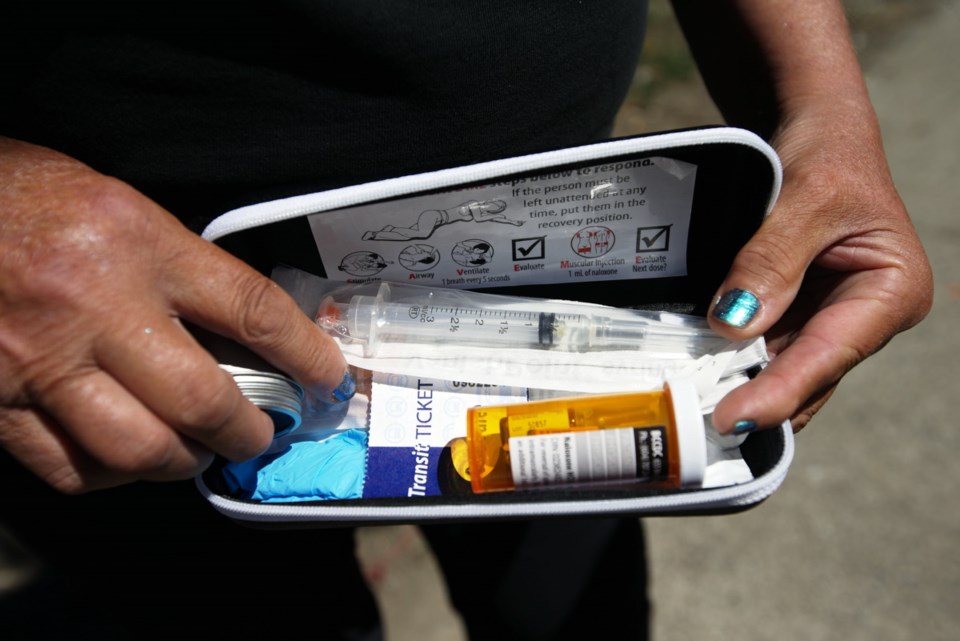Premier John Horgan says police departments will continue to have provincially funded naloxone kits to reverse potentially fatal opioid overdoses, after law-enforcement agencies raised the alarm this week that stockpiles had dwindled and funding had ended.
“When it comes to ensuring that police departments across the province have access to naloxone — so they can perform life-saving interventions with those in crisis — that will continue and it will be funded by the provincial government,” Horgan said Thursday. “Naloxone can save lives, we know that, and we want it to be as widely distributed as possible.”
Victoria police said earlier they haven’t had funding for naloxone kits since last year, and the department has taken $15,000 from its own human resources budget this year to equip officers with the life-saving drug.
“Training and equipping VicPD officers to administer naloxone has saved over 100 lives in Victoria and Esquimalt over the last three years,” said Bowen Osoko, civilian media relations officer for Victoria police. “That’s why, despite our resource challenges, we continue to use our budget to supply naloxone and training to our officers on how to safely administer it.”
Saanich Police Department said its supply of naloxone kits will expire at the end of the year. Const. Markus Anastasiades said Saanich police are prepared to purchase naloxone kits out of their budget for all front-line officers — “as they have proven to be an essential life-saving tool” during the opioid crisis — but they hoped the provincial government would provide funding.
“While we don’t use them as often as larger departments, we have deployed them as recently as Tuesday evening, which resulted in someone’s life being saved.”
One Naloxone nasal spray kit — a pack of two — costs approximately $125, he said.
Oak Bay Police Chief Ray Bernoties said police departments learned in April 2020 that the province was no longer funding the kits and inventories are now expiring.
The police chief described it as “a serious issue, as our members do encounter overdoses,” adding he’s “very grateful” the province will resume funding the kits.
The B.C. Ministry of Public Safety and Solicitor General’s policing and security branch funded Naloxone kits for four years, according to the ministry. It also funded the training of first responders to administer the overdose-reversing drug.
Last spring, when the funding was cut, police forces across the province had an “excess supply of Naloxone kits available to them,” the ministry said.
As those supplies have been decreasing or expiring, long-term funding is being identified in the provincial budget to ensure officers continue to be able to carry Naloxone, the ministry said in a statement.
“We are committed to ensuring there are no gaps and to identifying long-term funding so that police agencies are able to continue to have their officers carry these life-saving kits,” it said.
Horgan acknowledged the province’s stockpile of Naloxone for law enforcement is depleted and needs to be “renewed,” saying the Ministry of Public Safety and Solicitor General as well as the Finance Ministry and Ministry of Mental Health and Addictions are aware and working on the issue.
“It’s unfortunate that an alarm has to go off but when you hear an alarm you respond to it and that’s what we’re doing,” he said.
The province also supplies the kits to harm-reduction sites, pharmacies and corrections facilities. That supply is not affected, the premier said.
Paramedics responding to overdoses are also supplied with Naloxone, according to the Ministry of Public Safety and Solicitor General.
The B.C. Coroners Service reported 1,011 people died from suspected illicit overdoses from January to June — the highest death toll recorded in the first six months of a year since the opioid crisis was declared a provincial health emergency in 2016.
ceharnett@timescolonist.com



